
The Steve Miller Band is an American rock band formed in 1966 in San Francisco, California. The band is led by Steve Miller on guitar and lead vocals. The group had a string of mid- to late-1970s hit singles that are staples of classic rock, as well as several earlier psychedelic rock albums. Miller left his first band to move to San Francisco and form the Steve Miller Blues Band. Shortly after Harvey Kornspan negotiated the band's contract with Capitol Records in 1967, the band shortened its name to the Steve Miller Band. In February 1968, the band recorded its debut album, Children of the Future. It went on to produce the albums Sailor, Brave New World, Your Saving Grace, Number 5, The Joker, Fly Like an Eagle, Book of Dreams, among others. The band's Greatest Hits 1974–78, released in 1978, sold over 13 million copies. In 2016, Steve Miller was inducted as a solo artist in the Rock and Roll Hall of Fame.

Chilliwack is a Canadian rock band centered on the singer and guitarist Bill Henderson. They were active from 1970 to 1988; Henderson re-formed the band in 1997. The band started off with a progressive rock sound that incorporated elements of folk, indigenous, jazz and blues, before moving towards a more straight-ahead hard rock/pop rock sound by the mid-1970s. Their six best-selling songs were "My Girl ", "I Believe", "Whatcha Gonna Do", "Fly at Night", "Crazy Talk" and "Lonesome Mary". The band's line-up has changed many times.

"Summertime Blues" is a song co-written and recorded by American rock artist Eddie Cochran. It was written by Cochran and his manager Jerry Capehart. Originally a single B-side, it was released in August 1958 and peaked at number 8 on the Billboard Hot 100 on September 29, 1958, and number 18 on the UK Singles Chart. It has been covered by many artists, including being a number-one hit for country music artist Alan Jackson, and scoring notable hits in versions by Blue Cheer, the Who and Brian Setzer, the last of whom recorded his version for the 1987 film La Bamba, in which he portrayed Cochran. Olivia Newton-John recorded this song for her Clearly Love album in 1975.
Love Sculpture were a Welsh blues rock band that was active from 1966 to 1970, led by Dave Edmunds, with bassist John David and drummer Rob "Congo" Jones.

Raymond Edward Dorset is a British guitarist, singer, songwriter, and founder of Mungo Jerry.
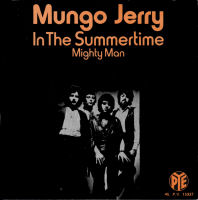
"In the Summertime" is the debut single by British rock band Mungo Jerry, released in 1970. It reached number one in charts around the world, including seven weeks on the UK Singles Chart, two weeks on one of the Canadian charts, and number three on the Billboard Hot 100 singles chart in the US. It became one of the best-selling singles of all-time, eventually selling 30 million copies. Written and composed by the band's lead singer, Ray Dorset, while working in a lab for Timex, the lyrics of the song celebrate the carefree days of summer. The track was included on the second album by the band, Electronically Tested, issued in March 1971.

Then and Now is a 2004 greatest hits compilation album by The Who released internationally by Polydor Records and by Geffen Records in the United States. It features 18 Who classics and two new tracks—"Real Good Looking Boy" and "Old Red Wine"—which were the first Who originals since "Dig" from Pete Townshend's 1989 album The Iron Man. "Real Good Looking Boy" is a tribute to Elvis Presley, and "Old Red Wine" is a tribute to former band member John Entwistle, who died in 2002. The album was re-released in 2007 and replaced "Old Red Wine" with "It's Not Enough" from the 2006 album Endless Wire and "Summertime Blues" was replaced by "Baba O'Riley".

Electronically Tested is the second album by the British rock band Mungo Jerry, released in March 1971.
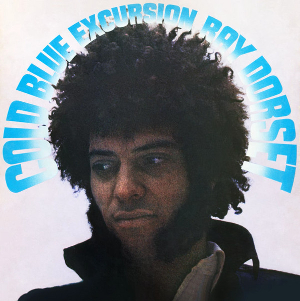
Cold Blue Excursion was a solo album recorded by Ray Dorset, leader of Mungo Jerry. The majority of the group's songs at the time were good-time blues, skiffle and rock’n’roll, and these songs on the solo album, written by him during the previous seven years, were designed to show his versatility as a songwriter away from the confines of the basic Mungo sound. The two photos of Dorset inside the gatefold sleeve — one of him sitting in a woodland clearing playing an acoustic guitar, the other of him onstage delivering an impassioned vocal performance with an electric guitar around his neck — summed the album up as well as the quotes from Woody Guthrie printed inside along the track list —"A song was just a song to me...In my own mind, a song is just a song..."
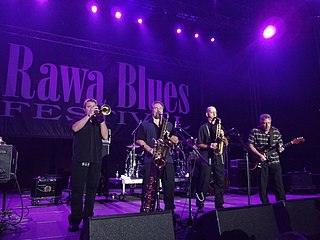
Roomful of Blues is an American jump blues and swing revival big band based in Rhode Island. With a recording career that spans over 50 years, they have toured worldwide and recorded many albums. Roomful of Blues, according to the Chicago Sun-Times, "Swagger, sway and swing with energy and precision". Since 1967, the group’s blend of swing, rock and roll, jump blues, boogie-woogie and soul has earned it five Grammy Award nominations and many other accolades, including seven Blues Music Awards. Billboard called the band "a tour de force of horn-fried blues…Roomful is so tight and so right." The Down Beat International Critics Poll has twice selected Roomful of Blues as Best Blues Band.
Paul Malcolm King, is an English musician who was a member of Mungo Jerry between 1970 and 1972. He contributed occasional lead vocals, and played acoustic guitar, banjo, harmonica, kazoo and jug. His songs on the first Mungo Jerry album and on the early maxi-singles were generally more folksy and lighter in style than those of group leader Ray Dorset, and he was frustrated when his own songs were constantly rejected for subsequent albums.
The Mixtures were an Australian rock band that formed in Melbourne in 1965.

"Long Legged Woman Dressed in Black" is a popular song and hit single by the British group Mungo Jerry, first released in 1974. It also became the title track of a compilation album by the group, released later in 1974.
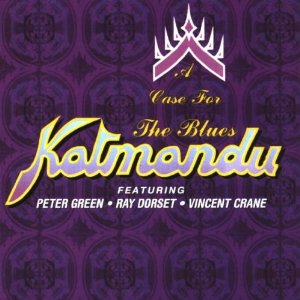
A Case for the Blues is a blues album by Katmandu, a British band made up of successful musicians from differing musical backgrounds, including Peter Green of Fleetwood Mac, Ray Dorset of Mungo Jerry and Vincent Crane of Atomic Rooster. Released in 1985, this was the only album by the band.

"Lady Rose" is a song by British group Mungo Jerry, released as a single in 1971.

"You Don't Have to Be in the Army to Fight in the War" is a popular song and hit single by the British group Mungo Jerry, first released in 1971.
Katmandu were a short-lived British blues band, formed in 1983, featuring Peter Green, Ray Dorset, Len Surtees and Vincent Crane. After releasing one album, the group split the following year.
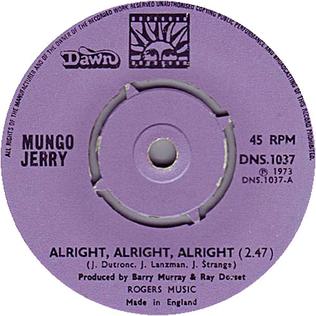
"Alright, Alright, Alright" is a popular song and hit single by the British group Mungo Jerry, first released in 1973.

"Open Up" is a song and hit single by the British group Mungo Jerry, first released in 1972.

Mungo Jerry is the debut album by Mungo Jerry, released in 1970. The initial British release featured lettering on the front of the sleeve and a group photo inside which appeared to be three-dimensional when viewed through a pair of 3D red and green lenses included in the packaging. It reached No. 14 in the British charts that summer. Some foreign versions include the track "In the Summertime".

















